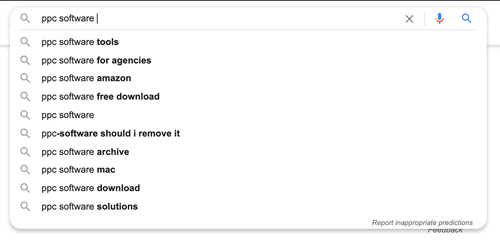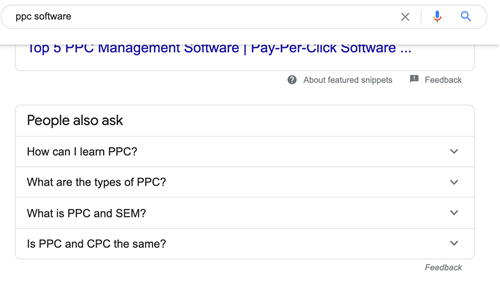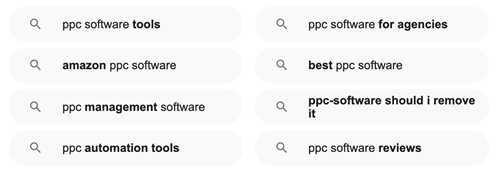The Ultimate Guide to PPC Keyword Research
11 January 2021
Running your pay-per-click (PPC) campaigns can be a daunting task, especially when it comes to considering the costs and budget you have available. Just like in SEO, keywords are vital if you want your PPC campaign to succeed and if you’re not a PPC expert, it can be hard to know how to choose the right keywords.
In this guide, you will find out exactly how to research keywords for your PPC campaign and how to choose the most appropriate. But first, we have a few PPC basics to cover.
Pay-Per-Click (PPC) is an online advertising model which sees businesses paying each time a user clicks on one of their online ads. There are different types of PPC ads, with the most common being the paid search ad that appears when we search for things online using a search engine like Google. This could be anything from clothing items to more high-end items like software. Businesses will only be charged when a user clicks on their ad, hence the term ‘pay-per-click’. Other forms of PPC advertising include display advertising, shopping, video, paid social and remarketing.
As marketers or business owners, it’s important to be explicit about the importance of keyword research for any online campaign. If you’re going to be investing a large budget on high-volume keywords, that’s not smart.
For your campaigns, you want to gather the keywords that are most relevant to your business and buyer search intent to ensure you’re only bidding to place your ads in front of customers who are likely to engage with your brand and complete your desired goal, whether that is to purchase your products or get in touch.
To help you identify the right keywords for your ads, we have put together a guide to help you with your PPC keyword research.
To kick off your PPC keyword research, start by writing down all the terms that you think your audience might be searching for when they want to come across your business, your products/services, or something like your products/services. Keywords are the linchpin between what people are searching, often sites may describe their offering in a slightly different way to what some people ask for, emphasising the importance of keyword research.
Our advice would be to break down keywords into the following different sections, allowing you to build up lists from there:
When we talk about branded keywords, it refers to those keywords associated with your own brand. Identifying these keywords are a no-brainer as they tend to have very low costs and very high-quality scores. In addition, they can yield excellent results in terms of click-through rates and conversion rates.
Many PPC guides may tell you to also bid on keywords related to your competitor’s branding, and while there are many pros to this such as the terms being cheaper to bid on due to the low competition and gaining brand awareness, there are cons that you must be aware of.
One of these cons is a lower CTR. Keep in mind that when someone is searching for a particular brand it’s likely they have already made the decision to purchase from them. Low CTR can then cause your Quality Score to decrease, resulting in higher click costs and lower positions on the SERPs.
There are cases where customers are just interested in finding a specific product or service but don't have a particular brand in mind. This is why having a list of product or service-specific keywords that include different variants is important when putting together your keyword research.
For example, if you’re a business that sells dog accessories, you will want to target keywords like:
When you're building up your list, remember more specific searches will likely be of a higher intent. These keywords generally have lower search volume and, as a result, have low costs and less competition. Be aware that long-tail keywords are likely to have limited impressions.
You can also choose to go for feature-specific keywords which focus on different key aspects of a product, service or brand that they’re looking for. For example, someone could be looking for “small office desks” for a working from home set up, or maybe “cheap accommodation in Belfast”. When going for these keywords, note they can be high-intent but it's not always the case.
Therefore, it’s important to balance out your targeted keywords by bidding on some broader keywords with higher search volume. These may have lower intent but can help you build brand awareness amongst users still in the research phase of their decision.
One of the easiest ways to learn is by what other people in the industry are doing, and you can even see what keywords they’re bidding most on, what they’re ranking for and more. There are a lot of competitor keyword research tools out there, but here at Loud Mouth, we recommend SEMRush.
Similar to organic keyword research, using a tool specifically for PPC will allow you to see a full list of search terms your competitor's ads are appearing for, what they’re paying per month, their ad positions and top-performing ad copies. When you’re viewing this information, consider those high-value keywords that you are going to benefit from.
Google is also a great place to start when it comes to keywords, and once you have brainstormed your ideas, run it through Google starting with those broader keywords to the more specific ones. In doing this, you will be able to collect more potential keywords. When searching your keywords, here’s what you need to do:



Use these suggestions to then pick the most relevant keywords for your ad’s content and add them to your current list.
There are many keyword research tools on the market, but for this article, we are going to talk through Google’s Keyword Planner to help you expand the list of keywords you’re creating. When using these tools, you want to enter in terms you think your audience would be searching for and also some of the keywords you already have on your list and look for suggestions.
Google’s keyword planner tool will give you information such as the average monthly search volume, competition and predicted bid costs. As we previously mentioned, this is an important step as often companies may describe their products or services in a different way than what people actually search for. Don’t worry about having such a long list at this stage, as the next step of the process will then help you to refine your keywords.
Now that you have spent time building up your keyword list, it’s time to make some cuts. By expanding on your list first without making any cuts keeps things from getting confusing and overwhelming. Using the keyword planner tool, you want to upload the list of keywords you have created.
From there, go through the list and carefully assess the different keywords you have selected, looking at the number of monthly searches, potential impressions and other key metrics such as predicted CTR and average CPC. In doing this, you will be able to find those high search volume, low competition and cost keywords.
Don’t just look for low cost because some of the most valuable keywords are going to cost more and they will be worth it because they send more highly-qualified leads to your site. Take all of this into consideration so you can start removing keywords from the list.
Once you are satisfied with the list of keywords you want to target, all you need to do is sort them into different ad groups.
In the event that you aren’t familiar with ad groups, these are groups of similar keywords users can search for to see your specific ads. Google recommends that you use ad groups to organise ads by a common theme such as the types of products or services you are advertising. For example, if the campaign was to promote desserts, you may have ad groups around the following product types:
Within each of these, you would have a number of related keywords and highly-relevant ads which include these keywords in the copy. When grouping them by subject, you can also group by user intent or stage of the sales funnel when possible. Having the ability to create customised copy to appeal to different audiences and their needs can be hugely beneficial and help you stand out amongst competitors.
While we have taken you through the majority of the keyword process in a lot of detail, we want to remind you of a few things to consider when putting together your ad groups to help get the best results.
The effectiveness of your chosen keywords could be directly impacted by the keyword match type you select. Keyword match types give Google criteria as to when to show your ads. There is ‘Broad Match’ which leaves Google open to their own interpretation and they can trigger your ad based on any search term they feel is relevant to your keyword.
Whereas ‘Exact Match’ only allows your ads to show for search terms that exactly match your keyword. Whilst Exact Match can help to ensure your ads are showing for the most relevant searchers, they can limit you from appearing in those great placements Google would have suggested. Based on your industry, budgets and goals, finding the right balance of keyword match types is key to winning on Google Ads.
Negative keywords are almost as important as everything else, they keep you from appearing in irrelevant searches. These are especially important if you include a number of broad match keywords in your strategy.
Competitor research can greatly benefit your keyword research but keep in mind that just because they spend a lot of money on a certain keyword that wouldn’t benefit you much, doesn’t mean you should necessarily put spend behind it too.
PPC keyword research is a key element of your search strategy and it does take time and patience to get right. If you think this is beyond your own capabilities, why not get in touch with Loud Mouth Media’s team of PPC keyword experts who are dedicated to driving great results to your site from your campaigns. Find out more today.